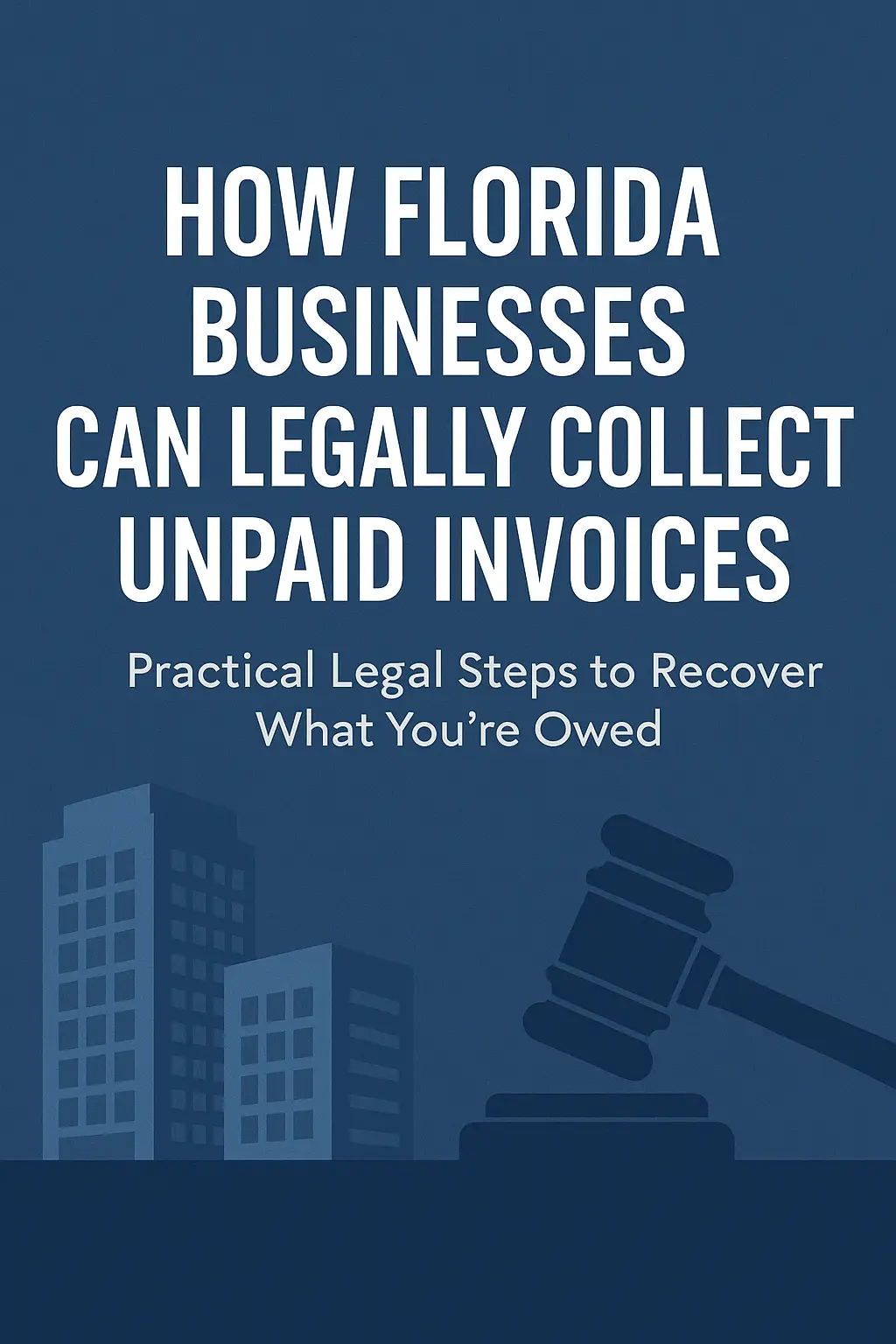Practical Legal Steps to Recover What You’re Owed
Late or unpaid invoices are more than just a nuisance—they’re a threat to your cash flow, your ability to operate, and your bottom line. Whether you’re in construction, professional services, distribution, or another industry, Florida businesses have legal tools to collect unpaid balances—but you have to use them correctly.
As a Florida construction and business attorney, I help companies every day collect what they’re owed. Here’s a practical guide to the legal process, what to do first, and how to protect yourself going forward.
📌 Step 1: Review the Contract (Or Agreement Terms)
Before taking any action, review:
- The contract or purchase order
- Any payment terms (due dates, late fees, milestones)
- Whether it includes an attorney’s fees clause (important!)
- What, if anything, the client is disputing
✅ Tip: If you don’t have a written contract, you may still be able to collect—especially if you can show work performed, invoices sent, and no valid dispute.
✉️ Step 2: Send a Written Demand for Payment
Many overdue accounts can be resolved with a well-drafted demand letter from your attorney. A legal demand should:
- Reference the specific unpaid invoice(s)
- Give a short deadline to resolve (e.g., 7 or 10 days)
- Mention the potential for legal action
- Include the total amount due with interest or late fees if applicable
A letter from a Florida business attorney often gets a faster and more serious response than calls or emails from your office.
🧱 Step 3: Determine If You Have a Lien or Bond Claim (Construction Only)
If you’re in construction (contractor, sub, supplier, etc.), you may have the right to:
- Serve a Notice to Owner (NTO)
- File a Claim of Lien
- Make a claim against a payment bond
These rights have strict deadlines under Florida Statutes Chapter 713. A Florida construction attorney can help you determine eligibility and timing.
⚖️ Step 4: File Suit If Payment Isn’t Made
If demand efforts fail, your business may need to sue for:
- Breach of contract
- Account stated
- Open account
- Unjust enrichment (if no contract exists)
Florida law allows businesses to recover attorney’s fees and interest—but only if your contract includes the right provisions.
✅ Small claims courts handle amounts up to $8,000 (excluding costs/fees), while county or circuit court handles larger cases.
💼 Step 5: Enforce the Judgment (If Necessary)
Winning a lawsuit is just part of the process—you still have to collect. We help clients:
- Garnish bank accounts or wages
- Levy assets or place liens
- Conduct post-judgment discovery (to find hidden assets)
If the debtor is a business entity, we also investigate:
- Whether assets were fraudulently transferred
- Whether corporate officers can be held personally liable in rare cases
🧠 Bonus: Prevention Is the Best Collection Strategy
To avoid future non-payment, your contracts should include:
- Clear payment terms and due dates
- Interest on past-due amounts
- Attorney’s fees clause
- Personal guarantee (for small or risky businesses)
- Clear rights to suspend work or withhold deliverables if unpaid
We help Florida businesses draft these protections up front—before invoices go unpaid.
👨⚖️ Work With a Florida Business Attorney Who Knows Collections
At Douglas Law Firm, we represent contractors, vendors, professionals, and business owners across Florida in collecting unpaid balances. Whether you’re chasing a single invoice or multiple accounts receivable, we offer:
- Strategic demand letters
- Effective litigation options
- Construction lien and bond claims
- Judgment enforcement when needed
📞 Ready to Get Paid?
If your business is owed money, don’t wait. The longer you delay, the harder it becomes to collect.
Contact Douglas Law Firm today to speak with a Florida construction and business attorney who can help you recover what you’re owed—legally and effectively.

